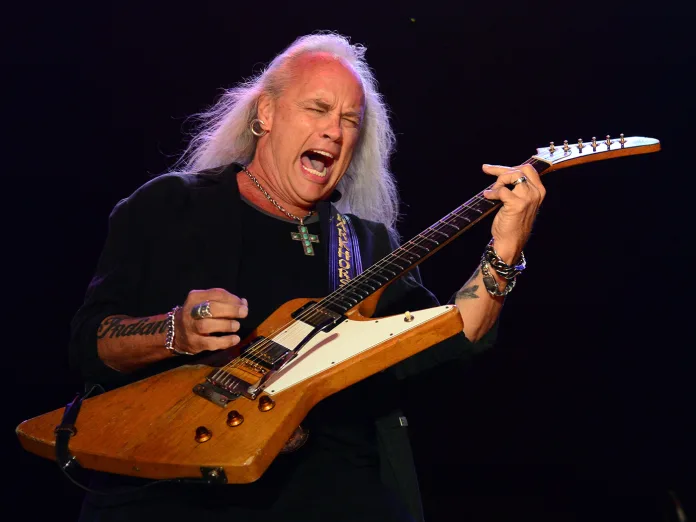HIT CHANNEL EXCLUSIVE INTERVIEW: March 2024. We had the great honour to talk with a legendary musician and a true gentleman: Rickey Medlocke. He is best known as a guitarist of Southern Rock heroes Lynyrd Skynyrd since 1996. He also was an early member of Lynyrd Skynyrd as a drummer and vocalist. In 1972, he left Lynyrd Skynyrd and reformed Blackfoot where he played lead guitar and sang lead vocals. With Blackfoot he released many great albums such as “Strikes” (1979), “Marauder” (1981) and “Highway Song Live” (1982). Rickey Medlocke Band just released the single “Never Run Out of Road” in support of the Missing and Murdered Indigenous Women (MMIW) Movement. A portion of the proceeds will be directed to National Indigenous Women’s Resource Center (NIWRC). Read below the very interesting things he told us:
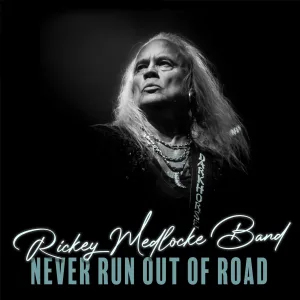 Could you tell us a few words about the writing and recording process of “Never Run Out Of Road” song?
Could you tell us a few words about the writing and recording process of “Never Run Out Of Road” song?
Well, it basically started a couple of years ago. Charlie Starr, the lead singer and lead guitar player for Blackberry Smoke, he and I got together and over the course of -I don’t know- maybe a month or so, we had actually the song written. When I started to do this side project, The Rickey Medlocke Band, I took the song and I played it for Mark Woerpel, the guitar player that is playing with me in the side band. What we did was: We listened to a lot of songs at my studio and found this song in particular was the one that we wanted to start out with recording, adding to it and trying to put it out. At the time, we didn’t know that we were going to have a record deal, we were just going to put it out on all the media platforms and to let people know that I was still doing songs on my own. What happened was: We got together with the head of Rock The Cause Records, who is a guy named Scott Herold and Scott came in and said what he likes to do, is that when he signs an artist, he would put the song out and the artist picks its favorable charity that it likes to donate part of the proceeds to, which I thought was amazing and I was into it big time. The charity that I chose was the Missing and Murdered Indigenous Women (MMIW) Movement Charitable Fund, who is the National Indigenous Women’s Resource Center (NIWRC). We ‘ve got a very bad situation here among Native women, girls and older women. For decades after decades Indigenous women have gone missing, they ‘ve found them deceased and it’s a bad that has reached epidemic proportions. It never really gets the attention, here in America, that it should get. So, putting this song out in a record label, it’s having really good success right now because it’s getting a lot of attention, not only because of the song itself, but because of the cause that part of the proceeds is going to. The song was basically finished, we just added a few things to it, mixed it, mastered it and there it is.
Are you satisfied with the response you got from fans in The Rickey Medlocke Band shows you played a few days ago?
Yeah, we just did two shows and it was a beginning process. When I ‘m off the road from Lynyrd Skynard, I like to have something to do. I mean, I get bored easily. I can only do so much fishing and I have to have something else to do. Therefore, the band was created to go out when Skynyrd has downtime, to go out and play shows and have a good time, to take up the slack.
Is it natural for you to incorporate your Native American roots into your music?
Oh, yeah. One of the big reasons why we did this one song and put it out and to the cause that we are donating to, is because of my heritage and the things that I see going on. I want to stay current in activism, towards Native Americans and for them, but my roots play a big deal in this and we ‘ll continue to do some, yes.
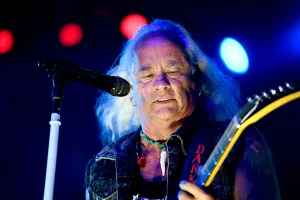 Do you miss playing with Gary Rossington (original Lynyrd Skynyrd guitarist -died in 2023)?
Do you miss playing with Gary Rossington (original Lynyrd Skynyrd guitarist -died in 2023)?
Well, yes. It’s only been a year since he passed away and it’s still a really touchy spot in my heart. I had always promised Gary that I would be with him in this band till the last note of “Free Bird” was played. You know what, I’m still here and even though he’s gone, I’m still gonna be here and fulfill that obligation and that promise. Gary is very missed by not only myself and Johnny (ed: Van Zant -vocals) and the rest of the band, but he’s very missed by the fans all together. We do a big tribute in the show to him upon the video wall that we have to “Tuesday’s Gone” and the thing is, still to this day I can barely look at that video. I just miss the guy being on stage with me and I miss being able to call him up. He is very missed, yes.
Was it a difficult decision to continue Lynyrd Skynyrd without Gary?
It was always Gary’s wishes to continue the legacy of the band and the music. Gary did not want it to fade out after he was gone and he expressed that several-several times, not only to us as a band, Johnny and I, but also to his family and people around him. So, when he passed away, Johnny and I got together on the phone and we decided that we wanted to keep it going and the band is back on the road now playing with ZZ Top and we are doing what is called the Sharp Dressed Simple Man Tour.
Do you have fun doing the Sharp Dressed Simple Man Tour with ZZ Top?
You know, we ‘ve been friends with these guys for so long. I mean, I ‘ve been friends with the guys going all the way back in the ‘70s. So, it is like having your own family out on the road with you, playing and I am finding it to be quite a thrill that we ‘ve got them out on the road with us playing, yes.
Were you surprised when Gary Rossington asked you to rejoin Lynyrd Skynyrd in 1996?
I had been up to Atlanta, Georgia to do the release of “Free Bird… The Movie” and it was the world premiere of it at the Fox Theatre and I had been invited to go up there to be with the band. I jammed with them on the stage the night before the world premiere, they had an all star jam. That’s when Gary and the rest of the band were able to see me playing. Lo and behold, I found out that Gary had been talking about doing that for several years but the timing wasn’t right. All of a sudden, after that world premiere in December of ’95, I get the call in March of ’96 and he is gonna come down and audition me and if I pass the audition, he was gonna give me $1.50 and a Snickers bar and he laughed about it and we joked about it for years. One night, I climbed upon the bus, many years later, after a gig one night and wouldn’t you know it, upon the counter of the bus, there was set a Snickers bar wrapped in $1.50 and a notice that it had been paid for. That was Gary’s sense of humour, my friend, he was like that.
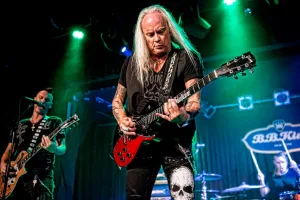 In your opinion what makes the music of Lynyrd Skynyrd relevant 50+ years after their formation?
In your opinion what makes the music of Lynyrd Skynyrd relevant 50+ years after their formation?
It’s actually the music itself. I mean, the music is so iconic and it will be here a lot long after I’m gone, that’s for sure. So, you ‘ve got to take into consideration how popular the music is and the songs are bigger than the band name itself. Under the banner of Lynyrd Skynyrd, you can think about “Free Bird” and “Sweet Home Alabama”, all these great iconic tunes and honestly, I guess it’s the reason why the fans keep flocking to see the band year after year and they don’t want it to go away. I know that after Gary’s passing we got bombarded, of course, with emails and messages and all the social media and the biggest thing was: “Don’t let this be the end of it”. So, we are continuing on and we are hoping everybody will get the chance to see the band comes out and seize the band the way it is, it’s a great band. Johnny and I, we are having a lot of fun keeping this legacy alive.
How important was the contribution of Al Kooper (producer –Blood, Sweet & Tears, Bob Dylan, “Super Session” keyboardist and vocalist) to the success of Lynyrd Skynyrd?
As far as my knowledge is, he took the band and signed the band to a 2-record deal on Sounds of the South. They did the first record (ed: “Pronounced ‘Lĕh-‘nérd ‘Skin-‘nérd” -1973) and he is credited for discovering Lynyrd Skynyrd. Going all the way back to the Muscle Shoals day (ed: when Rickey played drums and did vocals), I ‘d say that credit belongs to Jimmy Johnson (ed: he produced “Skynyrd’s First: The Complete Muscle Shoals Album” recorded in 1971-72) and David Hood (ed: session bassist at Muscle Shoals Studio), but Al Kooper is credited with discovering the band in Atlanta, recording them and putting them on a independent label called Sounds of the South Records, which was distributed by MCA. Well, if you notice, they moved off of Sounds of the South Records and went over to MCA, later on, full-blown. But I think Al realized there is something in this band, something in the musicianship that he saw, grabbed the whole of it, cultivated it and put out a couple of great records, no doubt.
How much has your approach to guitar changed over the years?
(Laughs) I guess my approach to play guitar has gone through some different evolutions, you should say. I like to think of myself more as old slowhand like Clapton, but a lot of people would dispute that and say: “There is nothing slow about his hands”. You know what, I’ve always been steadfast in my way of playing as far as a blues influence, because I was very influenced by the blues from my granddaddy, Shorty Medlocke, who was a Mississippi Delta guy and Ronnie (ed: Van Zant -vocals, died in 1977) even saw that is my dad’s (ed: he calls “dad” his grandfather Shorty) playing and took the inspiration of “Curtis Loew” (ed: “The Ballad of Curtis Loew” from “Second Helping” album -1974) from him to write that song. He dedicated a whole album, “The Nuthin’ Fancy” (1975) record to my granddaddy and even one of the songs on there, “Made in the Shade”. So, I think my playing has been steadfast in a blues influence, I take my licks and I am gonna be honest with you and tell you one of my biggest influences was Eric Clapton. When I was going to the steps of really honing in on being a lead guitar player and stuff like that, he was a big influence of my playing, absolutely.
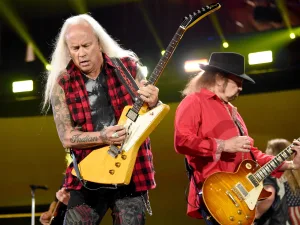 Do you have memories from the Lynyrd Skynyrd concert in Athens, Greece in 2012?
Do you have memories from the Lynyrd Skynyrd concert in Athens, Greece in 2012?
Oh-oh-oh, oh yeah! (laughs) The biggest memory I got is: We were met at the airport by this whole biker club (ed: Harley Davidson Club Hellas –watch here what Rickey is talking about). They met us at the airport, they escorted us to the hotel and it was so cool. It was one of the coolest things that we ‘ve ever experienced. I remember Johnny Colt, our bass player at the time, he jumped off the bus and got on the back of one of the motorcycles. We shot a video of it and we were all worried, man, we were like: “Oh my God, if they have an accident, our bass player is in jeopardy”. But I remember playing that show and I think the promoter thought that we were only gonna have about maybe 5.000-6.000 people and it turned out to be a whole stadium. They were ready for Lynyrd Skynyrd. You know what, what a beautiful audience. We were all just so freaked out of it and so proud and very honoured that people over there came out to see the band. Honestly, it touched our heart. It really did.
Are you proud that Blackfoot’s “Strikes” (1979) is considered a classic album?
Oh yeah, I really am. It had some great songs on it. I’m actually proud of all those years that I was with the band, but like all good things do come to an end. The “Strikes” album elevated us to heights that we thought we would never see with hits of “Highway Song”, “Train, Train” and “Left Turn on a Red Light” and so forth. But it ended up it was time for me to move on and I had the great opportunity to rejoin Lynyrd Skynyrd, the other guys who went on and did what they did and I still have great memories of those days.
What the story behind the writing of “Highway Song” (from Blackfoot’s “Strikes” album) with Jakson Spires (drums)?
We were going up from North Carolina up to New Jersey and we were on Interstate 81 and I had the song, the instrumentation, in my head and I’ve been playing it on guitar and we were sitting in the back of our van, because we travelled in a van at the time. We didn’t have the pleasure of being on a bus, but I said to Jak: “I have the song” and I started playing it and the first words out of my mouth was: “Another day, another dollar/ After I’ve sung and hollered” and that started it and within about 15 to 20 minutes, honestly, the song was written, just like you hear it now. It was magic and when a song comes to you that quick, you know you ‘ve got something special on your hands and we knew it. We knew we had something really special at the time like “Train, Train”. It was the very last song and we worked up to be put on the record and it came to me in rehearsal. Our producer/manager at the time, Al Nalli, said that we need one more song to finish this album off. We had written about -I don’t know- 14, 15 songs and we needed one more and I said: “There is a song that my granddaddy Shorty wrote way back in 1938, it was an old Delta blues tune that he used to call it ‘Railroad Man’ but he calls it ‘Train, Train’” and we set about in rehearsal and I started to play the lick and the next thing you know “Train, Train” is born. He appeared on the front of it playing harmonica and the harmonica in song and all that stuff. Things back then were just very magical with Blackfoot and those were very treasured years in my memory.
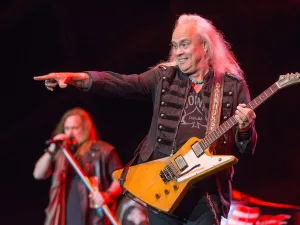 Was it an interesting experience to open for The Who with Blackfoot at the Silverdome in Pontiac, Michigan in 1979?
Was it an interesting experience to open for The Who with Blackfoot at the Silverdome in Pontiac, Michigan in 1979?
Oh man, you know your history! I just did a meet & greet on these dates that the Rickey Medlocke Band were playing and a guy came through the line that had a ticket to The Who at the Silverdome with us on the ticket. We were gonna take some time off the road and we got a call at our management’s offices in Ann Arbor, Michigan and it was their manager, Bill Curbishley, a premier talent agent and Roger Daltrey (vocals) and Pete Townshend (guitar) were sitting in the office and they requested us to be on the 16 shows that they were getting ready to do and we were just flipped and there you go, the rest is history. We came out, we were so freaked out by going out in front of 50.000-60.000 people. Next thing you know, I said we were gonna open with our strongest song and we were just gonna barrel through the set, because we had 30 minutes and we wanted to get everything in that we could. So, we started with “Train, Train” and we ended the show with “Highway Song” and we thought we were getting booed, but the people were shouting “Who” when we walked out. They were calling out The Who’s name and we thought we were getting booed, but they were calling for The Who. Then, all of a sudden we played our set and we were gonna get an encore, they were asking for more. We were really-really stoked and very proud of that whole thing. Actually, I got to be good friends with Daltrey, Entwistle (bass), Pete Townshend and their drummer, Kenney Jones. It was great.
How much impact did watching the Woodstock festival have on you as a young musician?
You ‘ve got to realize music was so raw and I ‘ve got a great saying: “Every song that could be written, had not been written yet. Today, every song that could be written, has been written now”. So, keeping that in mind, being in Woodstock, I am looking all these great artists and it was an eye-opener for me and my two friends. I won’t forget the morning waking up and hearing Hendrix playing “The Star-Spangled Banner” and it was a real eye-opener and very incredible experience. In fact, I got my original ticket here at home. Unbelievable experience, my friend.
I’ve watched the whole Blackfoot performance at Sweden Rock Festival in 1994 and it was fantastic. Did you have fun playing there?
Of course (laughs). When you ‘ve got audiences like that feed you the energy and you are giving the energy back and they are giving it back and you are passing it back and forth, the energy level just goes sky-high. When you got that kind of energy and you know that you own it as far as the set goes, there is no matching that. It’s just an incredible high. There is no drug or anything that can match that high, you know what I mean.
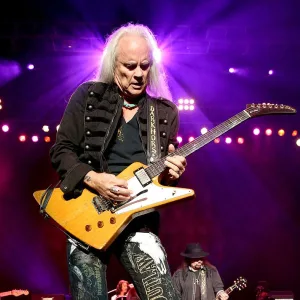 Who are your other influences as a guitarist, except Clapton?
Who are your other influences as a guitarist, except Clapton?
Well, Hendrix. Of course, you just mentioned one of them. Jimmy Page and especially Jeff Beck and none other than Billy Gibbons. I ‘ve listen to those guys, all of them, for so long and still do and last but not least, I got great influence from Eddie Van Halen, years later. Eddie is still one of my very favourite guitar players. Everybody rediscovered the guitar when Eddie came around. This guy, he reinvented the guitar. So, I mean, in the early years, he was just the most incredible player that I have ever seen.
Are you optimistic about the future of southern rock?
I am. I got to tell you there are some great bands out here such as Blackberry Smoke, Black Stone Cherry, there is another one, Whiskey Falls is over here, you ‘ve got young bands coming into the existence that’s got the southern flavor, that is born on the South. I am optimistic that they will stay in their vein of music and stay doing it. Let’s hope for them that the audience stays in tune with them, if they keep coming up with the goods, as far as material goes. Look, I don’t see any way of stopping them as far as the southern rock goes. You ‘ve got to be over here and you ’ve got to see some bands that they even don’t have a name yet that are in existence. So, my heart goes out to them and the best to them for all the success that they have.
Is it flattering that Lynyrd Skynyrd influenced great guitarists such as Zakk Wylde and Slash?
(Laughs) Well, I’ve done work with Zakk and he played on one of my obscure records, a record called “After the Reign” (ed: by Blackfoot -1994), an incredible guitar player. Slash took part in a tribute to Gary at the CMT Awards. I ‘m sure that we have had an influence on those guys at some point in their life and their career, I ‘m not really sure of how much. I’ve never really had a chance to stay one-to-one and talk to them at length about it. Look, almost every band that I’ve run across, one of their favorite bands has always been Lynyrd Skynyrd. I don’t know how much more of an influence you can have on somebody that comes forward to say: “That’s one of favorite bands”.
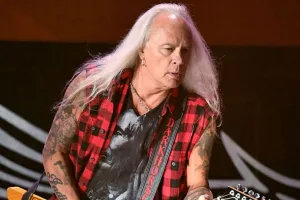 Had you ever met Stevie Ray Vaughan?
Had you ever met Stevie Ray Vaughan?
Oooh! You know, I did shows with Stevie Ray. I knew him a little bit. I got to tell you: He was one of the most incredible guitar players I’ve stood and watched and listened to. He is incomparable and there you go again: Big blues guy. If you look back at all the great guitar players, they ‘ve been heavily blues-influenced. Even Eddie Van Halen was blues influenced. He said that. So, to stand and watch Stevie Ray Vaughan and to be able to tour with him and to get to know him somewhat, you couldn’t meet and find a guitar player than that. I mean, you can search the world over, but you ‘ve not gonna meet and find one like that one. He goes right in there like all the rest of them that I’ve loved and listened to and there you have it.
Are you grateful to your grandfather Paul “Shorty” Medlocke for teaching you so many musical instruments?
I’ll tell you that my grandfather goes in the #1 category of being my biggest influence. He was a major-major player in me growing up. He started teaching me how to play banjo at the very early age of 3 years old, then I started playing guitar at 5 and drums at 8 years old. What I did, was I pick up on him, knowing how to play all these stringed instruments and not only did he play them, he played them great. Where he got that talent from, is amazing to me and I would say that my granddaddy has probably been my biggest influence in my life. He saved my life, him and my grandmother, they adopted me and raised me and they allowed me to explore music the way that I wanted to. They allowed me to explore rock music. I probably drove them a little bit crazy by playing music so loud in our home, in my bedroom and playing to drums and banging on everything, you ‘d play guitar so loud but hey, they allowed me to do it. I was their son and I went on to do what I am doing and they get all the credit for it.
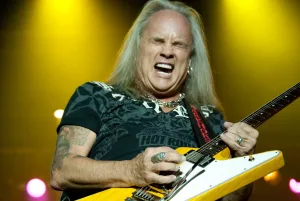 I know that Brian May (Queen) gave you a guitar. How did it come about?
I know that Brian May (Queen) gave you a guitar. How did it come about?
At the Rock and Roll Hall of Fame celebration (2006) for Lynyrd Skynyrd, we played “Free Bird” at the very end of the night and I came off the stage and there is a young man standing there and he said: “Somebody wants to shake your hand” and I said: “Who’s that?” and he said: “You ‘ll see” and I gave my guitar to my guitar tech and I followed this guy. We go down to the audience and we turn and Ozzy Osbourne stood up and shook my hand and Sting wasn’t too far from him and shook my hand about playing “Free Bird” and then we get to this one table and this guy stands up and lo and behold it was Brian May and his daughter is a big Lynyrd Skynyrd fan. He shook my hand and he said: “Ah, I like to see the hand that just played that 7-minute solo” or however long it was and I said: “No, forget that. I want to see the hands that played all the great Queen stuff”.
So, from that moment I said to him: “I’d love to come and see you guys while you are over here in the States playing” and he says: “So, be it”. I went to see them in Las Vegas when Paul Rodgers was singing with them, another one of my heroes, as far as a vocalist. I went to see them and I got backstage and they were all back there and Brian saw me again and said “hello” to me and I said: “God, I love your playing. Your guitars are just amazing” and we just let it go. He had a really-really close friend in Vegas, a guy by the name of Paul Crook and Paul had played with Anthrax and Meat Loaf and all these people. If you remember a production “We Will Rock You”, it was a tour where it was a celebration of Queen songs and Paul did the Queen parts in there and he became really good, great close friends with Brian and lo and behold he sent Paul his #3 guitar out of his rack and he said: “Please, give this to Rickey Medlocke” and I ended up getting it. I got it here, this is one of my most prized possessions and that’s the way the story went.
We both hate winter. What bothers you the most about winter?
Is that I cannot be out in the sunshine in my boat catching a fish (laughs). I ‘m not a fan of the cold weather. I ‘m a Florida boy, born and bred and when you are a Florida boy you don’t like the winter time, believe me. I have a thing about snow and chilly weather. I don’t really like anything below 60 degrees F (ed: 15,56 Celsius).
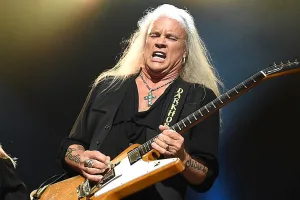 Do you think because of the streaming services listening to an album from start to finish is now becoming a kind of lost art?
Do you think because of the streaming services listening to an album from start to finish is now becoming a kind of lost art?
Yeah. I think the biggest disappointment that I got with the way digital music is now, is that you don’t get these albums that it’s got the artwork on it, you turn it over and it’s got more artwork, you get to read everything and you ‘ve got the credits for the record. I don’t know if it’s a lost art. I often say that during my days and I know that it sounds dated, but we were always able to go to the record store and be able to pick up an album and look at it and make our decision if we were gonna buy one or two or whatever and go home and be able to put it on the turntable, read the credits, all that stuff and just enjoy the moment with a brand new record. Now, you ‘ve got all these different platforms, you download it and you can listen to it, but I don’t know, somewhere along the way that art got lost. It’s a lost thing, you know.
A huge “THANK YOU” to Mr. Rickey Medlocke. I should also thank Mr. Scott Herold for his valuable help.
Buy Rickey Medlocke Band’s “Never Run Out of Road” single: https://orcd.co/arrzmp8
Rickey Medlocke Band Official Website: https://www.rickeymedlocke.com/
Rickey Medlocke Band Official Facebook page: https://www.facebook.com/RickeyMedlockeBand
Lynyrd Skynyrd Official Website: https://www.lynyrdskynyrd.com/


